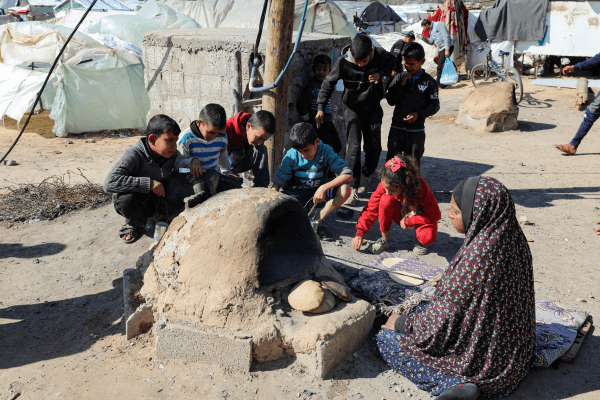I know I am not alone in feeling heartbroken by the horrific terrorist attacks in Israel on Oct. 7 and the dire humanitarian crisis unfolding in Gaza. The entirety of Gaza’s population — 2.2 million people — is ensnared in the grasp of extreme food insecurity and the outbreak of infectious disease; more than a quarter of these people find themselves in the throes of famine. I continue to pray for the release of hostages, for a lasting cease-fire, and for peace to reign in the region.
As Christians, addressing the distress of our neighbors is woven into the very essence of our faith. Christ’s fervent teachings in Matthew 25:37-40 make it plain:
“... ‘Master, what are you talking about? When did we ever see you hungry and feed you, thirsty and give you a drink? And when did we ever see you sick or in prison and come to you?’ Then the King will say, ‘I’m telling the solemn truth: Whenever you did one of these things to someone overlooked or ignored, that was me—you did it to me” (The Message).
Yet in Gaza, millions are being “overlooked or ignored.” Right now, people are starving and clinging to the fading hope that somehow territorial, historical, religious, and political crisis can yield to compassionate humanity.
This, friends, represents our highest and most crucial calling. We are compelled by the teachings of Jesus to offer help — and we must act.
Understanding the best way to help can often be complex.
While international efforts focus on negotiating a cease-fire and seeking a diplomatic resolution to the conflict — with countries like the United States, Egypt, Qatar, and the United Arab Emirates at the forefront — it’s crucial to consider immediate actions we can take to alleviate the suffering of millions.
A good first step would be reducing the bottlenecks of aid trucks stalled at the only remaining Gaza-Egyptian border crossings so food aid that has already been donated reaches people in desperate need — instead of just sitting in storage. Another good step would be providing additional medical assistance and sanitation, including safe drinking water. To do this, we must ensure U.S. global assistance programs and partner international aid organizations like the U.N. World Food Programme have enough funding to address this ongoing humanitarian crisis.
But the problem is bigger: Virtually all families in Gaza are forced to skip meals daily, and many adults go entire days and nights without eating so their children can. Yet, sadly, Gaza’s suffering is only one chapter in a global narrative of hunger and despair. The world stands amid the gravest hunger crisis of our generation, with up to a staggering 783 million people enduring chronic hunger. Among these, 47 million individuals in 54 countries face hunger at “emergency” levels or worse, as reported by the World Food Programme.
In Sudan, for example, following months of civil war, nearly 18 million people face extreme food insecurity, including 5 million people experiencing emergency hunger conditions. In Yemen, 17 million people are food insecure; 1.3 million pregnant and breastfeeding women and 2.2 million children under 5 are suffering from extreme malnutrition.
Other countries grappling with severe malnutrition and famine — a list that includes, but is by no means limited to, Afghanistan, Armenia, Burkina Faso, Ethiopia, Mali, Nigeria, Somalia, and South Sudan. Each of these nations remind us of the widespread affliction of hunger that touches every corner of our world.
Even as the need for funding grows, Samantha Power, the leader of the United States Agency for International Development (USAID) — the U.S. government’s agency that administers foreign aid from the American people — has warned that the agency’s total budget for humanitarian aid will be 35 percent lower in fiscal year 2024 than in 2023. This is caused, in part, because Congress has not provided supplemental humanitarian funding this year, which has been critical to the agency’s ability to respond to ongoing crises in years past.
Therefore, USAID has submitted an emergency supplemental humanitarian funding request to Congress to address these unprecedented crises. The supplemental funds requested will help to address the humanitarian crises in Gaza and elsewhere by providing food, shelter, water, medical supplies, and other critical relief items. Without the supplemental funds, USAID will be forced to drastically cut humanitarian funding from multiple regions, potentially including Gaza, leaving millions of people at risk of malnutrition and death.
As is the case in Gaza, conflict is a leading driver of hunger. In fact, 8 out of 10 of the world’s worst hunger crises are caused by conflict. And it is innocent people, particularly children, who suffer the most. Of the approximately 1.7 million people who have been internally displaced in Gaza, half are children.
While a diplomatically settled peace is the most obvious and lasting solution, a robust humanitarian response from the U.S., other nations, and partner international aid organizations can help address some of the suffering caused by these conflicts.
Earlier this month, the U.S. Senate passed an emergency supplemental humanitarian assistance package, with bipartisan support, that would provide more than $9 billion in aid to assist tens of millions of families in need, in Gaza and elsewhere. However, the humanitarian aid package was part of a $95 billion bill that included military aid to Israel, Ukraine, and other nations — and unfortunately the leadership of the U.S. House of Representatives has thus far not brought that bill to the floor for a vote.
Late last week, House lawmakers introduced a “compromise” to the larger spending bill that does not include the humanitarian aid package nor additional funding to assist the crisis in Gaza and elsewhere in Palestine. The potential impact of these outcomes is large-scale suffering and death.
Which brings us back to you, and what you can do today.
As the president of Bread for the World, I lead a Christian organization that stands in the breach, advocating for swift action by the House to secure this aid that is so vital for the sustenance of the people of Gaza and other regions. Your voice, too, can echo in the halls of power.
By writing your representative and urging them to support the humanitarian aid package, members of Congress will pay attention and, hopefully, be compelled to act. Reaching out to your representative to support this humanitarian aid package is not just an act of advocacy, but a profound expression of our shared commitment to alleviate suffering.
Our moral compass compels us to act — Jesus compels us to act and to extend our hands in compassion to those who are hungry. Inaction is simply not an option for us. Let us proceed with purpose, always bearing in mind the imperative: “Whenever you did one of these things to someone overlooked or ignored, that was me — you did it to me.”
Got something to say about what you're reading? We value your feedback!






